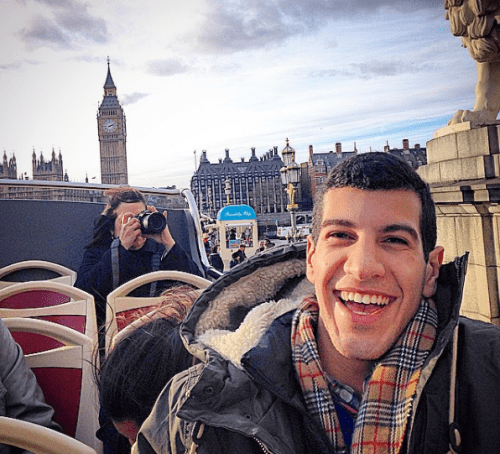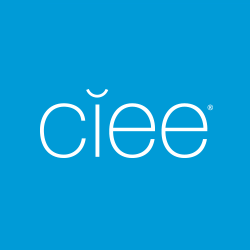CIEE's July Alum of the Month Pursues a Career in Foreign Policy
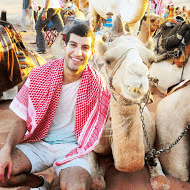
The Alum of the Month for July is Leyth Swidan. As a Jordanian-American, Leyth spent his childhood summers traveling between Philadelphia and Jordan, familiarizing himself with Arab culture and learning Arabic, which has contributed to his interest in global affairs and the Middle East. He is a recent graduate of Pomona College where he studied International Relations and Middle Eastern Studies. During his time at Pomona, Leyth studied abroad with CIEE twice; first in Amman, Jordan on the CIEE Diplomacy and Policy Studies program, and then at the School of Oriental and African Studies (SOAS) in London as a Gilman Scholar. This summer, he is interning in the Near Eastern Affairs bureau at the State Department before starting his Master of International Affairs program at Columbia University as a Pickering Fellow. Leyth tells us about his experiences studying abroad and his pursuit of a career in foreign policy:
“Ahlan wa sahlan! Jordan welcomes you.”
As a first-generation Jordanian-American, I spent my childhood summers traveling between the U.S. and Jordan, familiarizing myself with Arab culture and eating the national dish, mansaf. Coming from a Middle Eastern background has given me a global perspective, which has cultivated my understanding of the importance of increased dialogue and cultural awareness. I have always been caught between two different cultures as I have attempted to find the intersection between my identities as an Arab Muslim and LGBT American. While I have grown tremendously from traversing between these different cultures, it has not always been easy. Growing up in a post-9/11 America, experiencing Islamophobia, and witnessing U.S. media misrepresent reality in the Middle East has shown me the importance of countering bigoted narratives of Muslims and Arabs. As an Arab-American, I believed I was able to dispel these misconceptions, both as a student studying abroad and as a future U.S. diplomat.
As an international relations major, I hoped to gain insight into the regional politics of the Middle East from different cultural perspectives by studying abroad. I wanted to understand the local context of the Middle East issues to build off the knowledge I gained in classes at Pomona College. Being abroad, especially in Jordan, allowed me to interact with locals and learn about their attitudes and opinions on hot-topic issues, which is another perspective that I would not have gained in Claremont, a small suburban town in southern California.
I somehow avoided culture shock during my time in Jordan. As a Jordanian-American, studying in Amman was a breeze for me in terms of immersing myself and assimilating. I have family in Jordan that I was able to visit on weekends while still making friends with people on my study abroad program and experiencing the unending hospitality of my parents’ homeland. In fact, I even took two of my CIEE friends to my cousins’ weddings on separate occasions. I would often take the bus to Zarqa, a city 30 minutes north of Amman where most of my extended family lives. Not only did studying in a familiar country provide me with a sense of comfort, especially with family being only a taxi or bus ride away, but it also gave me an excuse not to cook in my apartment since I would often be invited to lunches and dinners with relatives! Yet, it was my first time being almost completely alone in a foreign country in the sense that I was not living with my parents, which afforded me some sense of freedom. I found time to explore sites in Amman that I had never been to before, like the Roman Amphitheatre and Rainbow Street, and revisit other parts of Jordan that I had seen before with friends, including the Dead Sea and Aqaba. While this gave me a chance to brag about how much of a local I was, I felt the complete opposite at times, especially when chatting with taxi drivers. I did not even have to say one word for locals to recognize that I was Arab, despite being with non-Arabs and speaking English. I often felt the need to explain that I was “a real Jordanian”, that I knew the country, culture, and people, understood how bad traffic was, and that I was not one of those people who just forgot about their cultural roots. I would get asked if I liked the U.S. or Jordan more and, more often than not, if I could help them get a visa to the U.S. “Enta wa hazak,” I would respond. “Try your luck.” But as soon as I began haggling taxi drivers in Arabic to use their meters instead of overcharging me, I felt more like a local than ever.
At the Jordan Institute of Diplomacy, I learned a lot about the regional dynamics of the Middle East and about Jordan's role as one of the few stable countries in the region. My favorite class was titled “Arab Diplomacy,” which focused on the politics, history, and diplomacy of the Middle East from the Great Arab Revolt of the early 20th century to the Arab Spring in the 21st century. Perhaps one of the reasons why I found it interesting was because my professor was the former Jordanian ambassador to Israel and was able to speak candidly about the Jordan-Israel peace talks.
In Jordan, one of the most eye-opening experiences for me was meeting with and talking to Syrian refugees in northern Jordan about the challenges they faced when crossing into Jordan and not having the money needed to buy the medicine necessary for a life-threatening condition. It was also eye-opening to see innocent children run around the house, unaware of the situation their parents were in during that time as the victims of a political conflict. I was there experiencing firsthand the consequences of the Syrian conflict that I had read about endlessly for at least two years, and I felt useless. I was there but couldn’t offer them anything. I couldn’t help them in any way. It was such a humbling experience to be able to match faces with words that I have read in articles. That visit to northern Jordan allowed me to learn more about the ongoing conflict and its impact on the lives of millions of Syrians more than any article could have. That experience abroad, along with the interpersonal diplomacy I practiced while living in Jordan, reinforced my desire to contribute to U.S. foreign policy in the Middle East as a diplomat in the United States Foreign Service.
London was completely different from Amman weather-wise, food-wise, and money-wise. When people ask me about my experience in London, I always respond with “cold and expensive.” As a Gilman Scholar, my budget was not completely limited during my time there, which allowed me to take advantage of being in Europe and not eat frozen meals for dinner every night. But beyond that, London was very much a vibrant, cosmopolitan city that Amman cannot be compared to. Of course, one wouldn’t want to miss out on the many tourist sites throughout the city – watching the changing of the guard at Buckingham Palace, looking at contemporary art at the Tate Modern Museum, laughing at the Merchant of Venice performance in Shakespeare’s Globe, and of course, posing for pictures with Big Ben. There was always something to do whether alone or with friends. I also enjoyed my time on campus, particularly the student-organized events that took place at SOAS’ student union, like international music bands, guest speakers, and poetry readings.
Academically speaking, I could not have chosen a better institution to study at than SOAS. There, I had the opportunity to study issues that I care about, like global migration and international conflict and development in small, in-depth tutorials, and was overwhelmed with the options of classes available. Being at a university instead of an institute like in Amman offered me access to books from SOAS’ library, one of the world's most important academic libraries for the study of the Middle East, diverse student clubs, and greater interactions with non-American students who were also at SOAS. By designing an academic curriculum that fit my intellectual interests, I was able to develop an understanding of global issues in relation to the Middle East through specialized course offerings and regional focus. The discussions, conversations, and debates I had with professors and fellow students in my classes throughout the semester ultimately furthered my interest in democratic governance of states while allowing me to gain insight into Middle Eastern politics from a range of diverse perspectives, given the large number of international students at SOAS.
My time abroad in both Amman and London was wonderful. I was challenged academically at school and personally as I stepped outside of my comfort zone to make new friends at SOAS. I learned how to be comfortable exploring new places without the company of others, and I took full advantage of everything both cities had to offer, including the free coffee at Waitrose in London! The interpersonal diplomacy I practiced while studying abroad reinforced my desire to contribute to U.S. foreign policy in the Middle East. Presenting American values abroad in Jordan and Britain allowed me to not only connect with others through cultural values, but also through shared narratives and experiences. I was fortunate enough to be awarded the Pickering Fellowship during my semester at SOAS, which will allow me to turn this passion into action, continue strengthening democratic governance with the U.S. Department of State, and represent a diverse America abroad as a future Foreign Service Officer.
I am currently interning in the Office of Levant Affairs in the Near Eastern Affairs bureau at the State Department. While my internship, study abroad experiences, and academic background at Pomona College have prepared me for a long-term career in the Foreign Service, I will pursue a Master of International Affairs degree at the School of International and Public Affairs at Columbia University this fall to gain the skills needed to formulate and implement U.S. foreign policy and to strengthen mutual understanding between the U.S. and the Arab world.
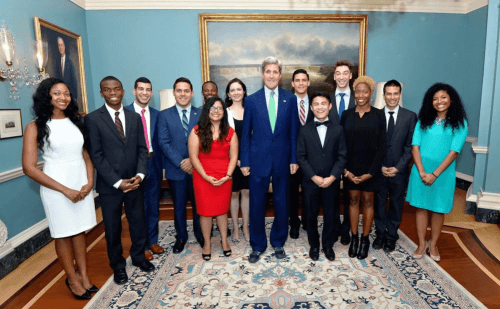
Related Posts
Jordan 2005: Looking Back a Decade Later
October Alum of the Month: Andrew Farrand CIEE Study Abroad in Amman, Jordan, Fall 2005 A proud Baltimore native, Andrew Farrand was a rising junior in Georgetown University's School of... keep reading
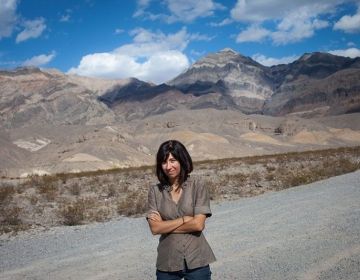
Interview: 4 Questions with CIEE study abroad alum Lindsey Leger
Lindsey Leger is a photojournalist and picture editor. She studied abroad in 2011 with the CIEE Language and Culture Program in Amman, Jordan. We spoke with her about her experience... keep reading
